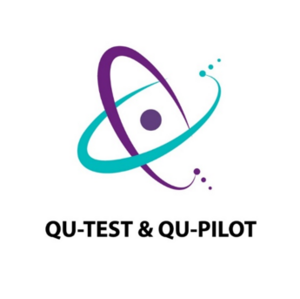
Qu-Pilot & Qu-Test
Pilot lines, open testing and experimentation for quantum technologies
Programm Indentification Code: HORIZON-CL4-2022-QUANTUM-06-SGA & HORIZON-CL4-2022-QUANTUM-06-SGA
Project ID: 101113983 & 101113901
(Co-funded by the European Commission)
Duration: April 2023 – September 2026
Project description
European industry faces challenges to translate quantum technology innovation into robust and scalable hardware processes and products. Against this background, the Qu-Test and Qu-Pilot projects span cooperative fields of high-class expertise and knowledge transfer in the EU framework.
Qu-Pilot
To start with, the Qu-Pilot project aims to leverage existing piloting infrastructure across Europe to support the growing European quantum technology industry. The consortium seeks to establish pilot facilities that will be well-networked and interact with each other, providing the quantum ecosystem with a ‘one-stop-shop’ offering unique facilities and know-how. In accordance, pilot lines will be categorized into four technology platforms to cater to a broad spectrum of applications like computing, communications, and sensing. The ultimate goal is to accelerate the time-to-market of European industrial innovation in quantum technology and establish a trusted supply chain.
Highlighting the expertise of the Fraunhofer HHI, the institute takes on the role of co-leading the photonics-pilot-line. In this context, the “Photonic Components” department provides InP- and silicon nitride platforms to the partner network. Moreover, continuous research is clustered to develop a Lithium Niobate-on-Insulator (LNoI) platform and hybrid integration of other platforms.
Qu-Test
To move further, the adjacent Qu-Test project aims to create a network of quantum technology testing and experimentation service providers across Europe. The consortium intends to upgrade, upscale, and integrate the testing and experimentation infrastructures as well as the associated processes for quantum technologies. Besides, the objective is to create an open-access distributed testing and experimentation infrastructure to make quantum technology facilities and associated services available to clients in all 27 EU countries. The target is thus to validate the relevance of the testbed service offering and the robustness of the Single-Entry-Point processes through the implementation of industrial use cases.
Achieving so, the Fraunhofer HHI owns the co-lead of the Quantum Communications Group.The group’s venture includes characterizing photonic integrated circuits (PICs) and prototyping miniaturized sources of entangled photons and quantum random number generators in InP and PolyBoard platforms.